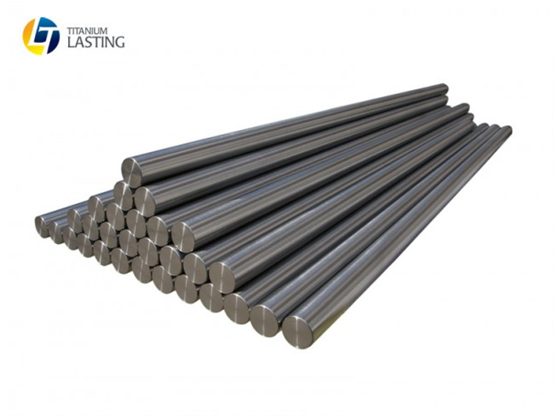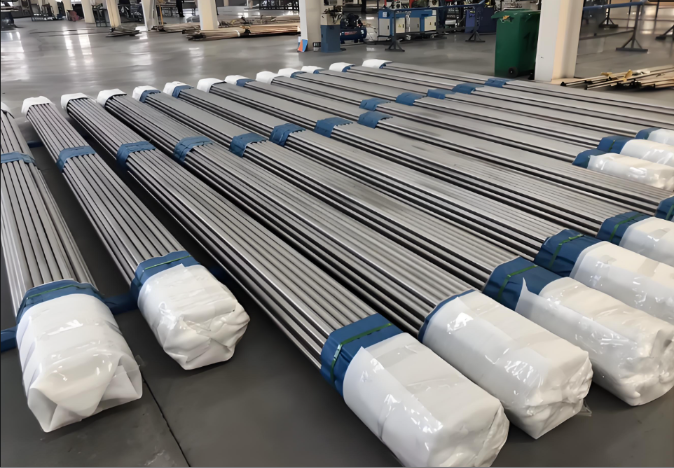Views: 289 Author: Lasting Titanium Publish Time: 2024-10-29 Origin: Site











Content Menu
● Introduction to Titanium Round Bar
● Material Properties and Characteristics
● Applications Across Industries
Titanium round bar represents a crucial component in modern manufacturing and engineering applications. These cylindrical metal products combine exceptional strength, durability, and versatility, making them indispensable across various industries. The unique properties of titanium round bars have revolutionized manufacturing processes and enabled breakthrough innovations in multiple sectors.
Titanium round bar exhibits remarkable physical characteristics that set it apart from other metallic materials. The material boasts an impressive strength-to-weight ratio, making it approximately half the weight of steel while maintaining comparable strength. This exceptional property makes titanium round bar particularly valuable in weight-sensitive applications. The material also demonstrates outstanding corrosion resistance, ensuring longevity even in harsh environmental conditions.
The mechanical properties of titanium round bar are equally impressive. The material showcases excellent tensile strength, fatigue resistance, and remarkable ductility. These characteristics enable titanium round bar to withstand significant stress and strain without compromising structural integrity. Furthermore, the material maintains its mechanical properties across a wide temperature range, making it suitable for both cryogenic and high-temperature applications.

The manufacturing of titanium round bar involves sophisticated processes to ensure optimal quality and performance. The production typically begins with raw titanium materials, which undergo careful processing through hot rolling or extrusion methods. These processes help achieve the desired circular cross-section while maintaining precise dimensional accuracy.
Quality control measures play a vital role in titanium round bar production. Manufacturers implement rigorous testing protocols to verify mechanical properties, chemical composition, and dimensional accuracy. Surface finish requirements receive particular attention, as many applications demand specific surface characteristics for optimal performance.
The aerospace industry extensively utilizes titanium round bar in critical components. Aircraft manufacturers incorporate these materials in engine parts, landing gear assemblies, and structural elements. The combination of high strength and low weight makes titanium round bar ideal for aerospace applications where performance and efficiency are paramount.
In the medical sector, titanium round bar serves as a fundamental material for various medical devices and implants. The material's biocompatibility and corrosion resistance make it perfect for orthopedic implants, surgical instruments, and dental applications. Medical grade titanium round bar undergoes additional processing to meet stringent healthcare industry requirements.
The chemical processing industry benefits from titanium round bar's exceptional corrosion resistance. These materials find extensive use in pumps, valves, and processing equipment exposed to aggressive chemicals. The material's ability to withstand corrosive environments ensures long-term reliability and reduced maintenance requirements.
Different grades of titanium round bar cater to specific application requirements. Grade 2 titanium round bar offers excellent corrosion resistance and moderate strength, suitable for general industrial applications. Grade 5 (Ti-6Al-4V) provides superior strength and is widely used in aerospace and medical applications. Each grade possesses unique characteristics optimized for particular use cases.
Titanium round bar manufacturing adheres to strict industry standards ensuring consistency and reliability. These standards specify requirements for chemical composition, mechanical properties, and dimensional tolerances. Compliance with these standards guarantees that titanium round bar products meet the demanding requirements of various applications.

When selecting titanium round bar, size specifications play a crucial role. Available diameters typically range from small dimensions suitable for precision components to larger sizes for structural applications. Proper size selection ensures optimal performance and cost-effectiveness in the intended application.
Various surface finish options are available for titanium round bar, including polished, ground, and as-rolled finishes. The choice of surface finish depends on the specific application requirements, such as aesthetic appearance, friction characteristics, or coating adhesion properties.
Proper handling of titanium round bar requires attention to safety protocols. The material's weight and surface characteristics necessitate appropriate lifting equipment and handling procedures. Additionally, storage conditions should protect the material from environmental factors that could affect its properties.
Machining titanium round bar requires specific techniques and tools. The material's properties demand appropriate cutting speeds, feed rates, and cooling methods to achieve optimal results. Proper machining practices ensure dimensional accuracy and surface quality while minimizing tool wear.
Proper storage of titanium round bar ensures maintained material properties. Storage areas should provide protection from environmental elements and potential physical damage. Regular inspection helps identify any signs of deterioration or damage requiring attention.
Regular inspection of installed titanium round bar components helps maintain system integrity. Inspection procedures may include visual examination, dimensional verification, and non-destructive testing methods appropriate for the application.
Q: What makes titanium round bar superior to other metallic materials? A: Titanium round bar offers an exceptional combination of high strength, low weight, and superior corrosion resistance. Its strength-to-weight ratio surpasses most metals, making it ideal for applications requiring both durability and weight efficiency.
Q: How does the cost of titanium round bar compare to alternatives? A: While titanium round bar typically carries a higher initial cost compared to steel or aluminum alternatives, its long-term benefits often justify the investment. These benefits include reduced maintenance requirements, longer service life, and improved performance characteristics.
Q: What are the primary considerations when selecting titanium round bar grade? A: Key considerations include the intended application, required mechanical properties, environmental conditions, and budget constraints. Different grades offer varying combinations of strength, corrosion resistance, and processing characteristics.
Q: Can titanium round bar be welded effectively? A: Yes, titanium round bar can be welded using appropriate techniques and equipment. However, special attention must be paid to protecting the weld area from atmospheric contamination during the welding process.
Q: What are the typical surface finish options available for titanium round bar? A: Common surface finish options include polished, ground, and as-rolled finishes. The selection depends on specific application requirements such as appearance, wear resistance, or subsequent processing needs.
This article explores the best titanium tubes for aerospace applications in 2025, detailing their properties, advantages, and key suppliers. It highlights the importance of titanium in the aerospace industry and discusses future trends, including innovations in manufacturing and sustainability. Understanding these aspects can help buyers make informed decisions in various aerospace applications.
This comprehensive guide explores how titanium sheets differ from other metal sheets, detailing their properties, applications, and considerations for buyers. It highlights the importance of selecting the right grade and supplier while discussing future trends in the titanium industry. Understanding these aspects can help buyers make informed decisions in various applications.
This comprehensive guide explores titanium sheets, detailing their properties, applications, manufacturing processes, and considerations for buyers. It highlights the importance of selecting the right grade and supplier while discussing future trends in the titanium industry. Understanding these aspects can help buyers make informed decisions in various applications.
This article explores best practices from top titanium sheet producers to ensure quality, covering aspects such as raw material selection, quality control measures, advanced manufacturing techniques, and surface treatments. It highlights the importance of technology in enhancing production efficiency and addresses common challenges faced in the industry.
This article explores the leading manufacturers of high-quality titanium sheets globally, highlighting their contributions to various industries. It discusses the unique properties of titanium sheets, their applications, and the factors that contribute to their quality. The article emphasizes the importance of titanium sheets in modern engineering and manufacturing, providing insights into their role in aerospace, marine, medical, and chemical processing applications.
This article explores the significance of titanium sheets for corrosion resistance, highlighting their unique properties, applications, and the factors that contribute to their performance. It discusses the various grades of titanium, maintenance practices, and the industries that benefit from using titanium sheets, emphasizing their role in modern engineering and manufacturing.
This article explores the significance of titanium pipe fittings in medical equipment, highlighting their biocompatibility, corrosion resistance, and low maintenance needs. It discusses their applications in surgical instruments, implants, and pharmaceutical manufacturing, while also addressing future trends and innovations in the field.
This article discusses how titanium pipe fittings minimize maintenance costs through their exceptional corrosion resistance, reduced maintenance requirements, and longevity. It highlights their applications in various industries, including chemical processing and marine environments, and emphasizes the cost-effectiveness of investing in titanium fittings. The strategic use of titanium in piping systems not only contributes to cost savings but also supports sustainable practices by reducing waste and the need for frequent replacements.
This article explores the top exporters of titanium pipe fittings to the US and Europe, highlighting key players like Titanium Industries and Alleima. It discusses the properties of titanium, market trends, and challenges faced by exporters, emphasizing the growing demand in aerospace and medical applications. The future of titanium pipe fittings looks promising, with ongoing innovations and a commitment to sustainability paving the way for new opportunities.
This article examines the lifecycle of titanium pipes in harsh environments, highlighting their unique properties, production processes, and applications. It discusses the advantages and challenges of using titanium pipes and explores future trends in titanium technology. As industries evolve, titanium pipes will continue to play a vital role in enhancing performance and sustainability across various sectors.
This article discusses titanium pipe welding techniques, highlighting their importance in producing high-quality components for various industries. It covers the advantages and challenges of welding titanium, the role of advanced manufacturing processes, and future trends in titanium processing. As technology advances, titanium will continue to play a vital role in enhancing performance across multiple sectors.
This article discusses the advantages of using forged titanium in chemical processing equipment, highlighting its strength, corrosion resistance, and durability. It explores various applications, economic benefits, and environmental considerations, making forged titanium a superior choice for the industry.
This article outlines best practices for sourcing high-quality titanium forgings, emphasizing the importance of defining requirements, researching suppliers, evaluating capabilities, and ensuring compliance with industry standards. By following these guidelines, manufacturers can secure reliable and high-performance titanium components for their applications
Content Menu● Why Attend?>> What to Expect from Lasting Titanium● Networking Opportunities● Industry Trends● Join Us!● Detailed Overview of the Event>> Event Highlights>> Sustainability Focus● Lasting Titanium's Commitment to Innovation>> Our Product Range>> Research and Development● ConclusionLasti
This article explores the environmental benefits of using titanium tubes in industrial applications, highlighting their corrosion resistance, lightweight nature, and recyclability. It discusses their applications in various sectors, including aerospace, energy, and medical fields, while addressing challenges in production. The article emphasizes the role of titanium tubes in promoting sustainability and reducing environmental impacts.
This article examines how China's titanium sheet industry competes globally, highlighting its strengths, challenges, and future outlook. It discusses the significance of advanced manufacturing technologies like Vacuum Arc Remelting and free forging presses in enhancing titanium quality. As the industry evolves, it faces opportunities and challenges that will shape its role in the global market.
This article explores the significance of Vacuum Arc Remelting (VAR) and free forging presses in titanium sheet production. It highlights their roles in enhancing the quality and performance of titanium sheets, discusses the challenges faced in production, and examines future trends in titanium processing. As technology advances, these processes will continue to play a vital role in various industries.
This article explores how advanced forging and rolling techniques improve the quality of titanium sheets, highlighting their unique properties, advantages, and applications. It discusses the challenges faced in titanium processing and the future trends in the industry, including additive manufacturing and sustainability initiatives. As technology advances, titanium will continue to play a vital role in enhancing performance across various sectors.
This article explores the advantages of titanium sheets in marine and offshore engineering, highlighting their exceptional corrosion resistance, lightweight nature, and durability. It discusses various applications of titanium in the marine industry and addresses the challenges associated with using titanium. The article concludes with frequently asked questions to enhance understanding of titanium's role in marine engineering applications
This article explores the corrosion resistance of titanium sheets in chemical processing, highlighting the mechanisms behind this property and the factors influencing corrosion. It discusses the various applications of titanium sheets in the industry and the advantages of using titanium as a material. The article concludes with frequently asked questions to enhance understanding of titanium's role in chemical processing applications.
